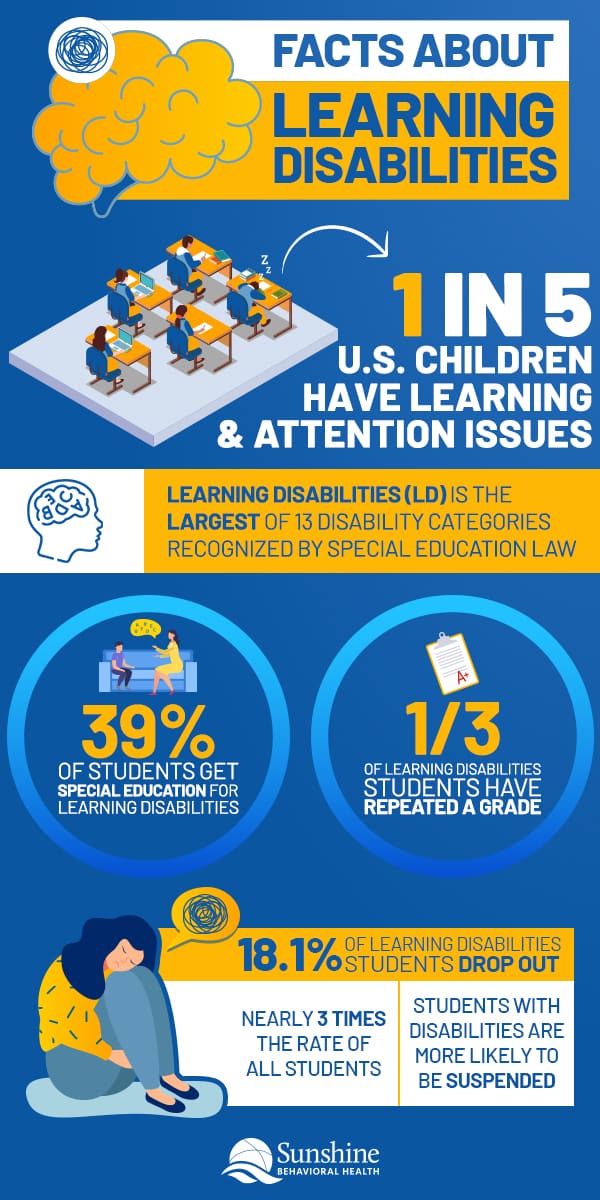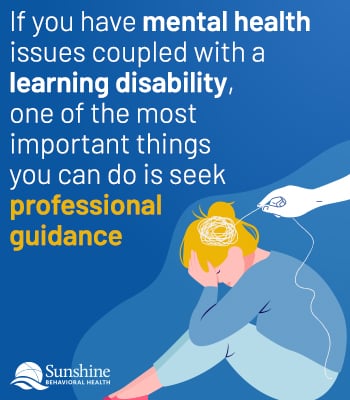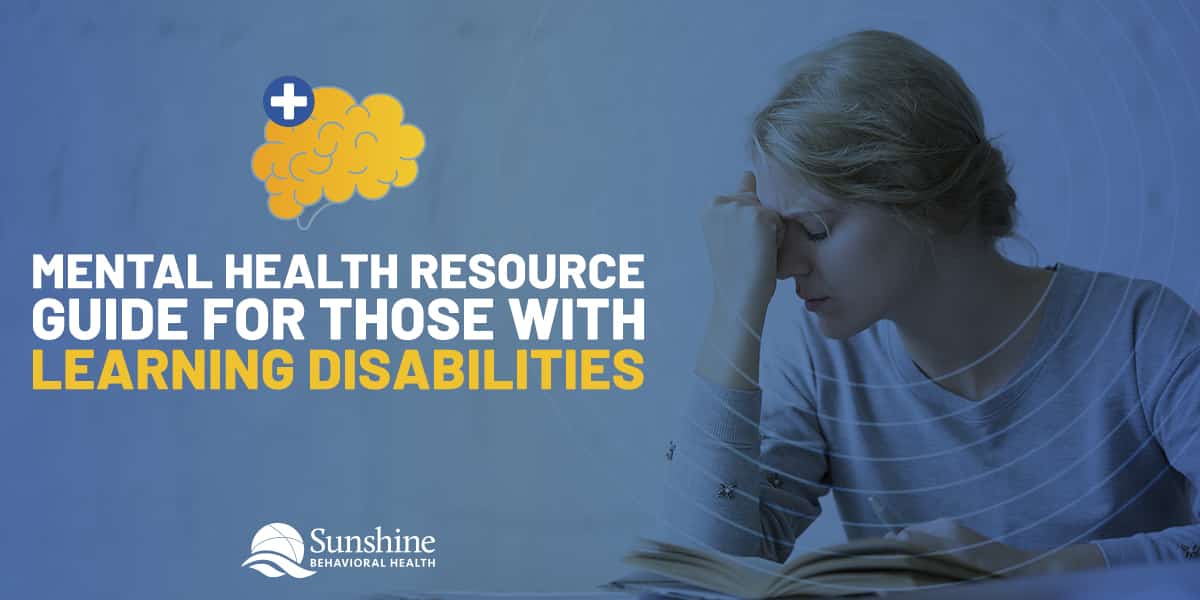What Are Learning Disabilities?
The Learning Disabilities Association of America defines learning disabilities as genetic and/or neurobiological factors that affect the cognitive processes related to learning and high-level skills such as planning, organization, and abstract reasoning. Learning disabilities include dyscalculia, dysgraphia, dyslexia, nonverbal learning disabilities, and oral/written language disorder and specific reading comprehension deficit. Dyslexia is the most common disability of the group.
Attention deficit disorder (ADD) and attention deficit hyperactivity disorder (ADHD) are commonly thought to be learning disabilities although this is not technically correct. These conditions are classified as “other health impairments” under the Individuals with Disabilities Education Act (IDEA) since the effects of ADD/ADHD don’t always impact educational capabilities and achievements. Even so, an estimated 20% to 30% of children who have ADD/ADHD also have a learning disability.
Autism and Down syndrome likewise affect learning but are not classified as learning disabilities. Down syndrome is an intellectual disability; learning disabilities, on the other hand, are not indicative of one’s intellectual abilities. Autism primarily affects communication and social skills rather than academic learning capabilities.

How Widespread Are Learning Disabilities?
It’s not uncommon for individuals to struggle with one or more learning disabilities throughout the course of their lives. Following are some statistics that put the conditions in perspective:
- Dyscalculia affects one’s ability to understand numbers and learn math facts. Estimates indicate that up to 3 to 7% of people (children, adolescents, and adults) have this learning disability. However, over one in four may actually have dyscalculia when mild cases are included in the total.
- Dyslexia affects one’s ability to learn how to sound out words, read, write, and spell. Up to 43.5 million adults and children in the United States are dyslexic.
- Dysgraphia makes it hard for a person to write properly and/or develop fine motor skills. It is unknown how many people have this condition, although estimates indicate that from 5 to 20% of children in the United States may battle with dysgraphia or other writing problems. As it’s difficult to outgrow dysgraphia, tens of millions of adults could be struggling with this condition on a daily basis.
Why Are Learning Disabilities Associated with an Increased Incidence of Mental Health Issues?
There are many reasons why individuals with one or more learning disabilities may be more prone to mental health problems. Many of these reasons stem from academic performance and school experiences.
Children with a learning disability are at a greater risk of being bullied at school simply because they are different or their challenges are put on display when people ask them to read or solve math problems in front of other students. Bullying has long been associated with depression, anxiety, and other health problems. Bullying can also lead to low self-esteem, which in turn may cause depression, anxiety, and/or addiction.
Furthermore, the inability to master academic skills in school may lead to a range of mental health problems. School failure has been linked with a higher risk of developing an addiction to drugs, alcohol, or tobacco. Substance addiction, in turn, may also contribute to mental health issues such as post-traumatic stress disorder (PTSD), borderline personality disorder (BPD), schizophrenia, anxiety disorders, bipolar disorder, and depression.
At the same time, mental health challenges don’t fade into the background for individuals with learning disabilities who have graduated from high school, college, or university. Genetics, which is a leading cause of many learning disabilities, can also play a role in mental health issues. Psychological stress and poor social relationships stemming from learning disabilities can cause mental health issues such as anxiety and depression.
Individuals with severe learning disabilities may not be able to adequately express their feelings, leading to a delay in receiving treatment or the inability to seek out professional help. People with learning disabilities may have a hard time finding or keeping a job, leading to feelings of worthlessness, low self-esteem, anxiety, and depression. Poverty arising from the inability to find a good job can cause or exacerbate mental health issues and make it difficult for a person to obtain the help they need.
What Are Common Mental Health Challenges of People with Learning Disabilities?
- 20% of children have learning and/or attention issues. Learning Disabilities Statistics and Prevalence | HealthyPlace
- Children with learning disabilities are 31% more likely to be bullied than their nondisabled peers. Learning Disabilities Statistics and Prevalence | HealthyPlace
- 46% of adults with a learning disability are employed. 20 Horrifying Learning Disabilities Statistics – Dialogical
- Over 28% of adults with a learning disability are obese. Obesity can contribute to mental health issues such as anxiety, depression, and bipolar disorder. Conversely, obesity can be caused or exacerbated by mental health issues such as anxiety and depression. 20 Horrifying Learning Disabilities Statistics – Dialogical
- Poverty has an outsize impact not only on the development of a learning disability but also on the severity of the disability. Statistics show that 5.4% of children who live in a home with an income less than 100% of the federal poverty level have a mild learning disability while 6.7% of poor children have a moderate or severe learning disability. These percentages decrease perceptibly as income level rises. 20 Horrifying Learning Disabilities Statistics – Dialogical
- 54% of individuals with a learning disability have a mental health problem. Mental health statistics: learning disabilities | Mental Health Foundation
- Children with a learning disability are four and a half times more likely to develop a mental health condition than their nondisabled peers. Mental health statistics: learning disabilities | Mental Health Foundation
Effective Ways to Deal with Mental Health Issues Related to a Learning Disability
Seek Professional Help
Do you have mental health issues coupled with a learning disability? One of the most important things you can do is seek out professional help. Find a doctor, counselor, psychologist, or other professional you can turn to for help should the need arise.
The Centers for Disease Control and Prevention (CDC) recommends calling for help if mental health issues have interfered with the ability to perform daily activities at least 14 days out of the month, or if stress has made it difficult to perform daily activities for several days in a row.
If you have suicidal thoughts, call 911 or a suicide hotline for immediate assistance.
Medical professionals use various types forms of treatment to help those with learning disabilities overcome mental health issues:
- Cognitive behavioral therapy (CBT) helps a person consider the relationship among thoughts, emotions, and behavior, and there is some evidence that CBT is an effective treatment option for people with PTSD, depression, anger, and low self-esteem.
- Psychodynamic therapy is designed to help individuals with learning disabilities identify and explore difficult emotions that typically lead to relationship problems, social withdrawal, anger, and aggression.
- Family therapy may be in order for children who suffer from a learning disability and a mental health condition. This treatment option not only benefits children with a learning disability but also their caregivers.
- Certain medications may be beneficial if you suffer from severe depression, bipolar disorder, or another serious mental health condition.
Helping Yourself
 There are also things you can do to avoid mental health problems or deal with mild mental health conditions. The Centers for Disease Control and Prevention (CDC) notes that it’s important to take care of your emotional health, so you can think clearly and make logical decisions.
There are also things you can do to avoid mental health problems or deal with mild mental health conditions. The Centers for Disease Control and Prevention (CDC) notes that it’s important to take care of your emotional health, so you can think clearly and make logical decisions.
Limit watching, reading, or listening to negative information in books, on the news, or on social media websites. Get enough sleep at night, so you have the physical and mental energy to handle whatever life may throw at you. Spend time doing things you enjoy in order to relax and gain the sense of accomplishment that can come from completing a task.
Connect with people you can trust and talk about what you’re facing. Bottling up your feelings can exacerbate mental health problems, while talking about what you’re feeling can alleviate stress and anxiety. Sharing your struggles can help make your family members and friends be aware of what you’re experiencing, so they can offer practical help with challenging tasks.
As there is a clear link between physical and mental health, you’ll want to care for your body as well as your mind and emotions. Eat healthy, balanced meals whenever possible. Avoid or limit junk foods and processed foods with little or no nutritional value. Try to steer clear of alcohol and drugs. Drinking and/or taking drugs may make you feel better about yourself temporarily but can lead to addiction and other mental health issues.
Exercise at least three times a week. Start slowly if you aren’t in the habit of working out regularly, and gradually increase the length and intensity of your exercise sessions. Any form of exercise is fine as long as it’s safe for you and you enjoy doing it. Outdoor exercise is especially beneficial if the weather permits, as being out in nature is good for mental and emotional health.
It’s also a good idea to develop one or more coping mechanisms to deal with day-to-day problems. Deep breathing and meditation are common ways to stop negative thought patterns, calm yourself, and think clearly.
Mentally reframing a situation, practicing gratitude, using your five senses to ground yourself, and applying emotional awareness to understand what you’re feeling and why are some good coping mechanisms that can help you get through your day and deal with mental health issues. Try out these methods to see what works for you, or use these ideas to create your own ways to cope with challenging situations.
Mental health issues are common among learning disabled and nonlearning-disabled individuals alike. If you find yourself facing mental health problems, don’t feel bad and don’t try to hide the way you feel. Take charge and do what you can to help yourself overcome them, and don’t hesitate to seek out medical help if needed. Severe learning disabilities coupled with one or more mental health issues can leave you with suicidal thoughts. If you feel like you no longer want to go on living, call the National Suicide Prevention Lifeline at 800a273a8255. The line is open 24 hours a day, seven days a week, 365 days a year. There are also Spanish-speaking operators and a special line for people who are deaf or hard of hearing. The site also offers a number of helpful resources, including a map for finding local crisis centers in your area. The National Alliance on Mental Illness (NAMI) offers a wealth of resources for anyone who is battling with a mental health condition, along with resources for parents and family members of a person who needs mental health assistance. NAMI’s site features stories and tips from people who have a mental health condition, and there is a helpline and a list of NAMI support centers that you can turn to for help when necessary. Mental Health America (MHA) provides webinars, podcasts, and practical assistance related to mental health and learning disabilities. The site also offers access to a peer support group, so you can connect with others who face the same struggles that you do. There are resources specifically dedicated to those who battle with mental health and a learning disability; what’s more, there are specialized toolkits for African Americans and people of color, the LGBTQ community, and students. It’s all too common for mental health issues to lead to addictions and/or substance use disorder. If you need help overcoming an addiction, FindTreatment.gov provides help with finding local treatment centers. It offers a handy search function that lists thousands of state-licensed providers in any given area. Treatment center search results on this site can be sorted depending on the payment type accepted, the types of treatment provided, and other criteria. Additionally, the site provides information on how to cover the cost of treatment if finances are a concern.
Trusted Resources
National Suicide Prevention Lifeline
NAMI
MHA
FindTreatment.gov
Sources
Medical disclaimer:
Sunshine Behavioral Health strives to help people who are facing substance abuse, addiction, mental health disorders, or a combination of these conditions. It does this by providing compassionate care and evidence-based content that addresses health, treatment, and recovery.
Licensed medical professionals review material we publish on our site. The material is not a substitute for qualified medical diagnoses, treatment, or advice. It should not be used to replace the suggestions of your personal physician or other health care professionals.







